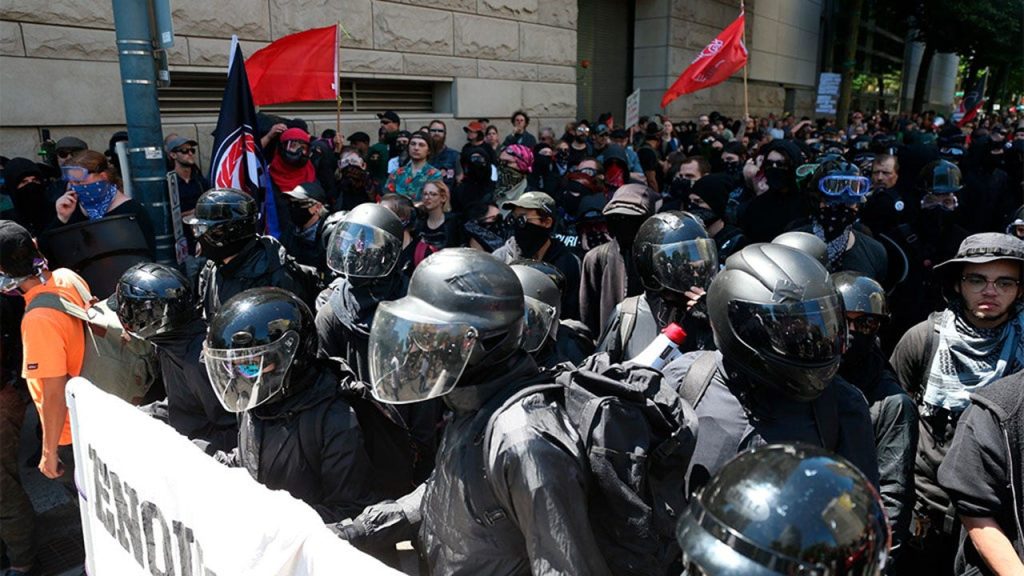Trump Takes Aim at Antifa: Experts Weigh In on Legal Strategy
In the wake of Charlie Kirk’s tragic assassination, President Donald Trump announced his intention to designate Antifa as a terrorist organization, sparking debate about the legal frameworks available for such action. While current U.S. terrorism laws under the Immigration and Nationality Act primarily target foreign groups with no specific federal statute for domestic organizations, experts point to alternative legal avenues that could prove effective. Michael Balboni, an attorney with extensive homeland security experience in New York State government, suggests the Racketeer Influenced and Corrupt Organizations Act (RICO) could serve as a powerful tool in this context. This strategy would focus on prosecuting Antifa not as isolated incidents but as an “ongoing criminal enterprise,” potentially allowing for what Balboni describes as an “enterprise-wide roll-up” of individuals associated with the group.
The legal approach through RICO would require establishing several key elements: proving the existence of an enterprise, demonstrating a pattern of racketeering activity within the past decade, showing evidence of continued criminal behavior, and connecting defendants directly to the enterprise. This strategy offers significant prosecutorial power without necessarily requiring the formal terrorist designation that typically applies only to foreign entities. However, Balboni emphasizes a critical challenge in this approach – maintaining the delicate balance between targeting violent criminal acts while preserving Americans’ First Amendment rights to peaceful protest. “It’s a very fine line,” he notes, distinguishing between legitimate political expression and criminal activities like arson or other violent actions that cross legal boundaries regardless of political motivation.
Drawing on Trump’s previous administrative record, Balboni expresses confidence in the president’s ability to leverage existing legal frameworks to address the Antifa issue. “This is what President Trump has been able to do successfully,” Balboni observed. “He’s been able to take a concept and then kind of take the existing laws and wrap it around the concept.” This approach might prove particularly effective against what Balboni describes as a group with limited public sympathy. “If you’re advocating the overthrow of the United States, if you’re advocating the use of violence to promote your agenda, if you’re advocating civil disruption, I’m not sure who’s going to stand up for you,” he said, suggesting that the administration’s characterization of Antifa as “professional agitators” attempting to cause disruptions might resonate with the broader public.
The announcement comes in direct response to the shooting of Charlie Kirk, a prominent conservative figure known for his advocacy of open debate. Kirk was killed on September 10 at Utah Valley University during the first stop of his “American Comeback Tour.” According to family members, the suspect, Tyler Robinson, had been “radicalized” as his political views shifted leftward. This connection between the assassination and perceived left-wing extremism has intensified calls for stronger measures against groups like Antifa, which Trump has long characterized as a threat to public safety and civil order. In his announcement, the president indicated that his administration would not only designate the group as a terrorist organization but also investigate those responsible for funding Antifa “with the highest legal standards and practices.”
For a more comprehensive solution to domestic terrorism concerns, Balboni suggests that Congress could take legislative action by either creating a separate law addressing domestic terrorist entities or amending the current Immigration and Nationality Act to encompass domestic groups. Such legislative changes would provide a more permanent framework for addressing extremist violence regardless of ideological orientation. This approach would potentially shift the responsibility from executive action to a more durable statutory foundation, addressing concerns about the limitations of current law when dealing with domestic rather than international threats. The debate highlights the complex interplay between national security concerns and constitutional protections that has characterized much of America’s response to perceived threats across the political spectrum.
The designation of Antifa as a “major terrorist organization” represents a significant escalation in the federal approach to domestic extremism, particularly those groups associated with left-wing ideology. House Freedom Caucus members and other Republican legislators have expressed support for Trump’s decision, viewing it as a necessary step to combat political violence. The move comes amid heightened political tensions following Kirk’s assassination and ongoing concerns about ideologically motivated violence from various quarters. As the administration moves forward with implementation, legal experts anticipate challenges both in terms of constitutional questions and practical enforcement, while supporters maintain that decisive action is necessary to prevent further violence and protect public safety in an increasingly polarized political environment.


